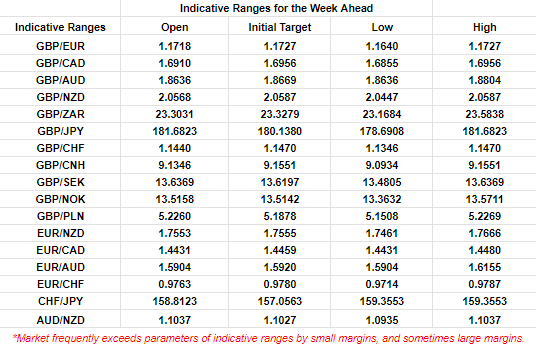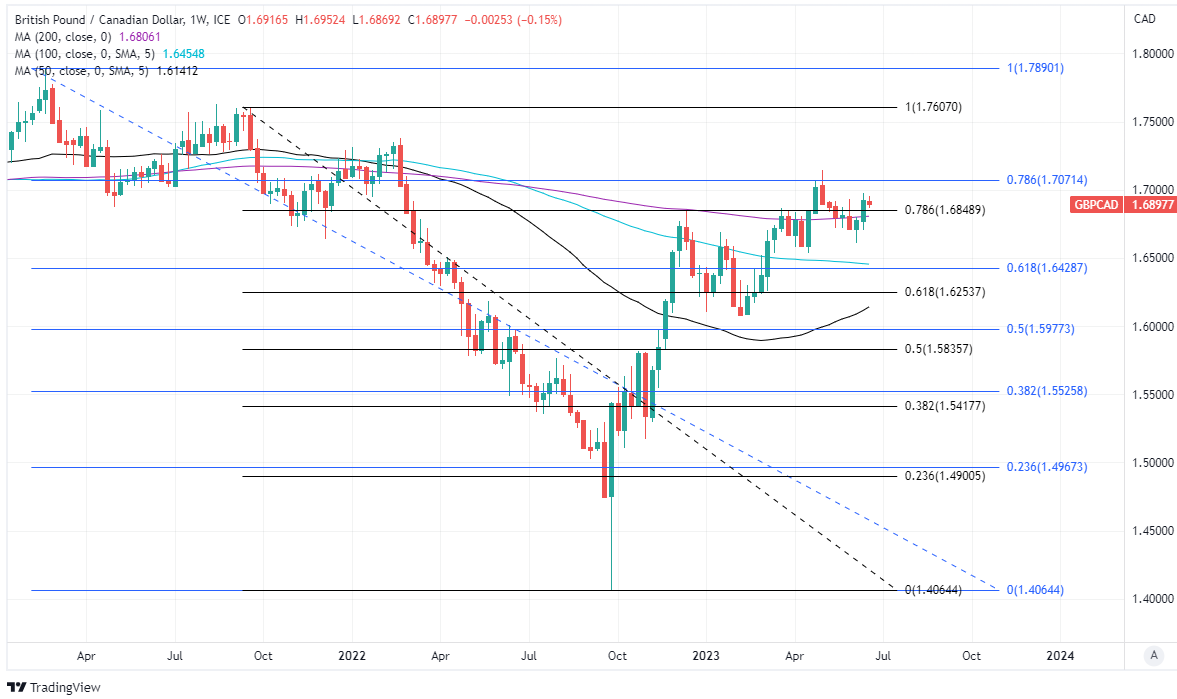GBP/CAD Week Ahead Forecast: Vulnerable without Big BoE Surprise
- GBP/CAD supported at 1.6823, 1.6719 & 1.6648
- Big BoE Bank Rate rise may drive short-lived rally
- But gains potentially limited once beyond 1.6960
- CA retail sales data & BoC minutes also in focus

Image © Adobe Stock
The Pound to Canadian Dollar exchange rate receded further from June highs to open the new week and potentially needs a big Bank of England (BoE) Bank Rate surprise on Thursday if it's to avoid falling back toward earlier lows around 1.6648 up ahead.
Canada's Dollar sat in the bottom half of the G10 currency basket for the week to Monday but was higher in relation to many G20 counterparts but none rose as broadly as the Pound, which climbed across the board amid a further aggressive increase in market-implied expectations for the Bank of England (BoE) Bank Rate.
Interest rate swaps have risen to suggest Bank Rate could now reach 6% by early in the new year, up from 4.5% currently, dragging rates for new and refinanced mortgages after the UK's core inflation rate climbed to 6.8% in the most recent reading and wage growth reached a new record in excess of 7% once bonuses are excluded.
"Rarer than hen’s teeth have been the times in my working life when average pay has risen 6.5%y/y. Rarer still for that to be a real term pay cut (by 2%). Such are Les Temps Modernes," says Ross Walker, chief UK economist at Natwest Group.
"Economic growth may be flat, but the UK is a jobs-rich manor," he adds in a blog post.
Above: Selected moving averages and Fibonacci retracements of November's China reopening rally indicate possible areas of technical support for GBP/CAD. Click for closer or more detailed inspection.
Sterling and GBP/CAD could benefit this week if the recent data or Wednesday's inflation figures lead the Bank of England (BoE) to raise Bank Rate by a larger measure than the 0.25% increase to 4.75% expected by economists and markets though it's far from clear how long any rally would be sustained for.
The uplift in expectations for Bank Rate helped GBP/CAD rally further off its 100-day average at 1.6648 after this month's increase in the Bank of Canada (BoC) cash rate to 4.75% and appeared to be catalysed by U.S. Bureau of Labor Statistics data suggesting a sharp increase in new unemployment claims in the U.S.
"BoC ‘minutes’ as well as retail sales are the key highlights this week. In terms of levels, the near-term range is expected to be 1.3175-1.3320," says Bipan Rai, North American head of FX strategy at CIBC Capital Markets in a Monday reference to USD/CAD.
Canada's Dollar might be most interested this week in what the BoC's Summary of Deliberations from its June meeting says on Wednesday about the prospect of further increases in the cash rate being announced any time soon but retail sales figures for April will also likely be of interest beforehand.
These will show how the Canadian economy fared at the opening of the second quarter and whether it's likely to meet Statistics Canada's preliminary estimate of a 0.2% increase in GDP for the opening months, though the midweek release of UK inflation figures for last month might be more impactful for GBP/CAD.
Above: Quantitative model estimates of ranges for this week. Source Pound Sterling Live.
Some analysts advocate trading falling inflation rates like they're a negative influence for exchange rates while the author has done so too previously but the Pound itself has fallen in response to rising inflation over the last two years so this week's data might be more of a downside risk for GBP/CAD than anything else.
The consensus is for inflation to fall from 8.7% to 8.4% but with the core rate remaining at 6.8% in an outcome that would be unlikely to deter the markets from anticipating another run of interest rate rises from the BoE over the coming months.
But the highlight of the week and likely the most formative influence on the outlook for Sterling is Thursday's interest rate decision and whether the Monetary Policy Committee will attempt to get ahead of market pricing for borrowing costs.
"Regular mortgage repayments have been remarkably stable. They equalled £5.0B in April, up only £304M, or 6.5%, on a year earlier and £424M from the end of 2021," says Samuel Tombs, chief UK economist at Pantheon Macroeconomics.
"By process of elimination, then, we can conclude that the only way households have kept their repayments down is by lengthening their mortgage terms when they refinance," he writes in a Monday research briefing.
Above: Selected moving averages indicate possible areas of technical support for GBP/CAD while Fibonacci retracements of 2021 and 2022 falls denote possible technical resistances.



